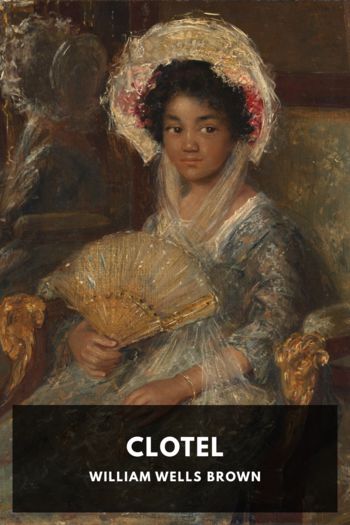Clotel - William Wells Brown (good books to read for beginners txt) 📗

- Author: William Wells Brown
Book online «Clotel - William Wells Brown (good books to read for beginners txt) 📗». Author William Wells Brown
At first Clotel feared that it was a plan by which the negro wished to try her fidelity to her owner; but she was soon convinced by his earnest manner, and the deep feeling with which he spoke, that he was honest. “I will take the money only on one condition,” said she; “and that is, that I effect your escape as well as my own.”
“How can that be done?” he inquired.
“I will assume the disguise of a gentleman and you that of a servant, and we will take passage on a steamboat and go to Cincinnati, and thence to Canada.” Here William put in several objections to the plan. He feared detection, and he well knew that, when a slave is once caught when attempting to escape, if returned is sure to be worse treated than before. However, Clotel satisfied him that the plan could be carried out if he would only play his part.
The resolution was taken, the clothes for her disguise procured, and before night everything was in readiness for their departure. That night Mr. Cooper, their master, was to attend a party, and this was their opportunity. William went to the wharf to look out for a boat, and had scarcely reached the landing ere he heard the puffing of a steamer. He returned and reported the fact. Clotel had already packed her trunk, and had only to dress and all was ready. In less than an hour they were on board the boat. Under the assumed name of “Mr. Johnson,” Clotel went to the clerk’s office and took a private state room for herself, and paid her own and servant’s fare. Besides being attired in a neat suit of black, she had a white silk handkerchief tied round her chin, as if she was an invalid. A pair of green glasses covered her eyes; and fearing that she would be talked to too much and thus render her liable to be detected, she assumed to be very ill. On the other hand, William was playing his part well in the servants’ hall; he was talking loudly of his master’s wealth. Nothing appeared as good on the boat as in his master’s fine mansion. “I don’t like dees steamboats no how,” said William; “I hope when marser goes on a journey agin he will take de carriage and de hosses.” Mr. Johnson (for such was the name by which Clotel now went) remained in his room, to avoid, as far as possible, conversation with others. After a passage of seven days they arrived at Louisville, and put up at Gough’s Hotel. Here they had to await the departure of another boat for the North. They were now in their most critical position. They were still in a slave state, and John C. Calhoun, a distinguished slave-owner, was a guest at this hotel. They feared also that trouble would attend their attempt to leave this place for the North, as all persons taking negroes with them have to give bail that such negroes are not runaway slaves. The law upon this point is very stringent: all steamboats and other public conveyances are liable to a fine for every slave that escapes by them, besides paying the full value for the slave. After a delay of four hours, Mr. Johnson and servant took passage on the steamer Rodolph, for Pittsburgh. It is usual, before the departure of the boats, for an officer to examine every part of the vessel to see that no slave secretes himself on board. “Where are you going?” asked the officer of William, as he was doing his duty on this occasion.
“I am going with marser,” was the quick reply.
“Who is your master?”
“Mr. Johnson, sir, a gentleman in the cabin.”
“You must take him to the office and satisfy the captain that all is right, or you can’t go on this boat.”
William informed his master what the officer had said. The boat was on the eve of going, and no time could be lost, yet they knew not what to do. At last they went to the office, and Mr. Johnson, addressing the captain, said, “I am informed that my boy can’t go with me unless I give security that he belongs to me.”
“Yes,” replied the captain, “that is the law.”
“A very strange law indeed,” rejoined Mr. Johnson, “that one can’t take his property with him.” After a conversation of some minutes, and a plea on the part of Johnson that he did not wish to be delayed owing to his illness, they were permitted to take their passage without farther trouble, and the boat was soon on its way up the river. The fugitives had now passed the Rubicon, and the next place at which they would land would be in a Free State.
Clotel called William to her room, and said to him, “We are now free, you can go on your way to Canada, and I shall go to Virginia in search of my daughter.” The announcement that she was going to risk her liberty in a Slave State was unwelcome news to William. With all the eloquence he could command, he tried to persuade Clotel that she could not escape detection, and was only throwing her freedom away. But she had counted the cost, and made up her mind for the worst. In return for the money he had furnished, she had secured for him his liberty, and their engagement was at an end.
After a quick passage, the fugitives arrived at Cincinnati, and there separated. William proceeded on his way to Canada, and Clotel again resumed her own apparel, and prepared to start





Comments (0)